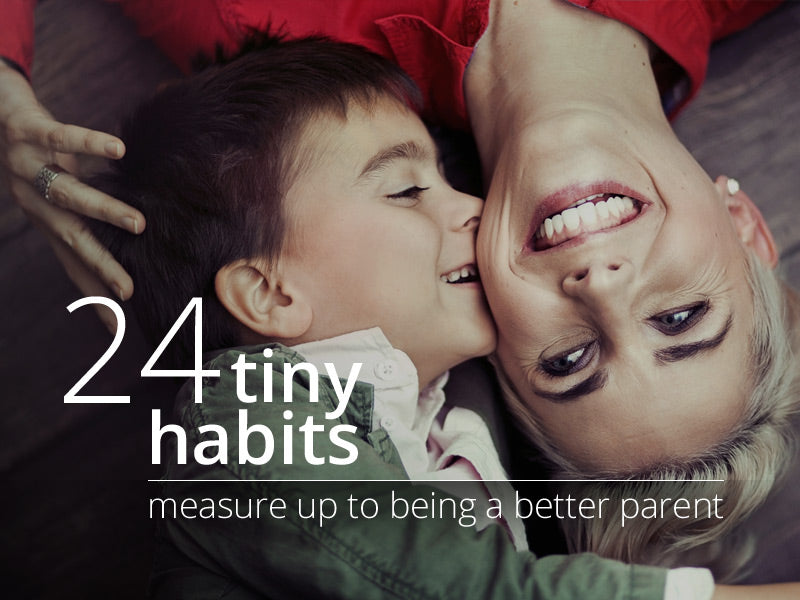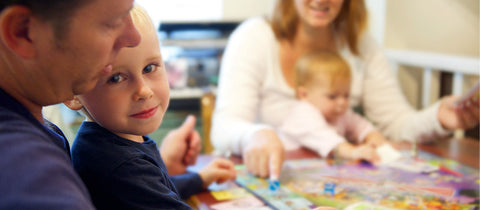24 Tiny Habits: Changes That Can Make You a Different Parent a Year from Now

by Molly Ryan
Jan 28, 2020
There are so many times we hear “it’s the little things that add up to be the big things”. As our parenting journey evolves year-by-year it is easy to lose track of all those small things and get swallowed up by the day-to-day challenges. It’s equally as easy to get so frustrated by the overwhelming expectations that are laid upon us by so many outside influences, that we slowly start to feel like we can never do it all. Our list of tiny habit changes is aimed to help give parents little tips on how to change a couple of small things each month that will end up being the big things to your children.
- Smile before you walk into a room occupied by your child or loved ones. This resets your mood and conveys a positive attitude when you greet your family.
- Read a book daily to your child. Reading and sharing stories help spark your child’s imagination, it helps develop vocabulary, it stimulates curiosity and helps the development of communication skills.

- Spend 10-30 minutes outside daily. Running, jumping, and doing an assortment of large motor skill activities has been proven to aid with everything from sensory skill development to increasing happiness.
- Talk to another parent about your parenting struggles. We all need to decompress, connect with others like us, and hear a new approach to our growing list of things we are having a hard time with. It’s important to make sure we are talking through these struggles and moving on.
- Turn your phone on silent or take it to another room during every mealtime. Modeling healthy eating habits, giving your children your full attention, and developing an open time for interaction is easy to do when there are no cell phone distractions.
- Walk whenever you can wherever you can. Walking is relaxing, it improves mood, it tones the whole body, and promotes all-over wellness.
- Dedicate a day per month to learn a new game and play it with your child. There are many websites that list developmental play games for infants up to teenagers. Each month dedicate a day to learning a game together and playing it.

- Do a small act of kindness with your child. Modeling kindness and generosity helps a child see beyond their own needs and fosters a sense of community.
- Treat sleep like it’s a necessity and remove bad habits gradually that prevent you from sleeping. I realize that every parent that has a baby or toddler just groaned a little, but sleep hygiene and our dedication to the need for good sleep is the key to our good mood and health as parents.
- Hug your child for more than 15 seconds each day. A simple long, concentrated hug shows your child that you are always there for them and will comfort them through any situation.

- Pay attention to the pointless things you do and how many minutes your waist doing them. When you find yourself scrolling through social media, stop and try going to bed, playing with your kids, go outside, etc. The more you catch yourself doing these things the less you will do them.
- Pick a section of any room in your house each month and declutter it. Our minds are constantly fed a string of distractions and things that stimulate us, both positively and negatively. By removing excess clutter we begin to create a sense of calm in our homes little by little.

- Tell your child that you are proud of them and inspired by them as often as you can. Everyone needs positive feedback. The words “proud” and “inspired” directly speaks to their character and lets your loved ones know that you are impacted by who they are.
- Wear clothing that is the best combination of clean, comfortable, and something that makes you feel confident. Taking a moment to make sure you feel good in the clothes you are wearing is an important step in how we feel about ourselves.
- Try one new recipe each month and involve your child in the process of selecting the recipe, purchasing the ingredients, and preparing the food. Showing your child how food arrives at the dinner table helps them see the effort that is put into preparing food, and how we take care of ourselves.

- Sit on the couch or floor with your child with no distractions and invite them to share their day, just watch them, sit, listen and absorb who they are and what’s important to them.
- Laugh with your child. Find something that makes them smile, giggle, and laugh. Beyond the benefits of mood-boosting, laughter can increase the circulation of antibodies in the bloodstream and make your child more resistant to infection.
- Relax with your child. Fully commit to the art of relaxation, fully engage in recharging your body and mind, and teach your child this skill.
- Tell your child that you are grateful for them and comforted by them. Helping a child understand the emotional connection we all have to each other and how thankful we are for it, is key to a child understanding their importance to you. They matter, teach them this at a young age and affirm it as often as possible.
- Get up 30 min earlier than your children. Do a small household chore and then take 15 min to yourself. Starting the day feeling accomplished demonstrates your own control to make a difference and see change. Sitting back and enjoying the rewards to your efforts is an important step in asserting your own self-value.

- Pay attention to nurturing and building your “village”. Having a community of parenting partners helps us deal with stress, make better lifestyle choices, gives us strength, and allows us to rebound quicker from distress. Helping others helps inspire a better perception of yourself, reduces stress, and gives us a positive outlook.
- Write down your goals each month and stay accountable to them. Goals help motivate us towards a result and are a major component of personal development. Setting a goal for financial freedom, more playtime, being more organized, or spending more time with family are a few examples of how we can shift our focus towards what we truly want.
- Volunteer with your child. Volunteering means working with others to make a meaningful contribution to a better community. There are several small things that are easy to involve your child in. Pick up trash around your neighborhood, plant flowers at a church, bring a meal to someone who just had surgery, volunteer at a food bank, make gifts for the elderly are all great ways to show your children ways they can help.
- Teach your children everything you know. It’s often easier to just do something yourself vs taking the time to teach your children how to do things; however, these opportunities to teach are the cornerstone of how they learn to be adults, and it starts at a young age. Everything from folding socks to learning how to use a computer, teach it all.

Molly Ryan
Molly is a mom of 5, grandma of two and a baby product expert. For the last 23 years she has enjoyed connecting parents to products and resources that help make their parenting journey uniquely theirs.













